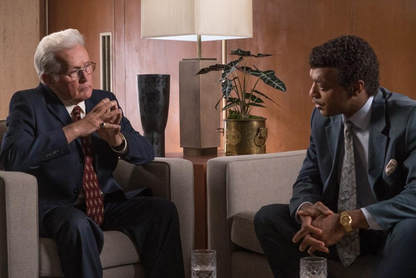C+ | A preacher reconsiders the idea of hell and makes himself into a heretic. Directed by Joshua Marston Starring Chiwetel Ejiofor, Martin Sheen, and Condola Rashad Initial Review by Jon Kissel |

By backgrounding the intellectual work of creating a new doctrine, Marston and Hinchey instead foreground an arc for Pearson that further detracts from the drama. Come Sunday is a character study that takes for granted the inciting incident which disrupts Pearson’s life. It’s less interested in causes (why he loses his congregation) than the effects, as in how the congregation made him feel. The former is the more unique and intriguing film in that it would’ve involved a lot of discussion and refinement of the inclusive theology. The latter is an easier script to write, and is therefore the film we get. Pearson enjoys the balls-and-strikes simplicity of saving souls, allowing him to rack up big numbers to one day present to god after he dies. That, plus the adulation of having a large and respected congregation, gives Pearson an inflated sense of self that’s tied to the outward signs of success, all of which he’ll have to give away as a result of his epiphany. Scorsese’s Silence dealt with some of this, where missionary work is shown to be more for the missionary than the converted, but that was one piece of a much larger tapestry. In Come Sunday, it’s a pat and insufficient summary of a more complicated man.
The better arc comes in Pearson’s move from a fear of god to a love of people. The homophobia of the pentecostal church comes in for a deserved lashing here. Roberts gay son, who killed himself in his 30’s shortly after coming out, is framed as a test for the great preacher, instead of as a needless and pointless loss of life caused by a father’s callousness and cruelty. Keith Stanfield’s Reggie, Pearson’s organist, is another gay man that Pearson has a difficult time ministering to. Stanfield is a great and versatile actor, and the anguish in his performance is evident. Pearson is not tending to Reggie’s actual needs, but instead is clumsily sculpting him into a prescribed and restrictive form that’s not helpful for anyone. Pearson breaking out of this thinking, even after recognizing his inclusive theology, is short-changed with little more than thinking about the lyrics to a trite children’s song. It’s not great criticism to weigh the movie that is against the movie you’d prefer, but it’s so easy to imagine a film where Pearson has his epiphany, intellectually battles himself and his colleagues with it, and then follows the initial revelation to further epiphanies in how he should be ministering to the shunned and cast-out. We instead get a mostly-internal struggle backed by uncinematic insistence and the painful transition from an opulent house to a comfortable one.
If Come Sunday falls on the negative side of a what-if scenario, it’s not like there isn’t good stuff here. I appreciate Marston’s low-key direction, most noticeable when it frames Pearson as a rock star emerging from his dressing room before a big performance. Ejiofor is credible as a magnetic personality holding together a large and diverse congregation, one of the few able to thwart what MLK called the ‘most segregated hour of Christian America.’ Any needling of casual christianity is also something that’s going to work on me. Pearson’s sermon when he first discusses his doctrine gets acclamation and amen’s when he’s talking about saving all those Rwandan orphans himself, both of which cease when he says how foolish such an effort would be. His congregation doesn’t actually give a shit, but they imagine themselves as godly people who enjoy being in the presence of someone who claims they do. The film tiptoes up to the idea that living in relative comfort and luxury is a great sin when so many have so little; that if there was a hell, it’d be the indifferent who would join the evil. That’s too big of an idea for a film with modest aims.
Come Sunday leaves the viewer with a sense that this is totally fine and competent, well-acted and directed. It also completely lacks the stickiness of the This American Life episode, making it disposable. Pearson the man is simply less interesting than Pearson the heretical minister, but Come Sunday is sure of the opposite. C
 RSS Feed
RSS Feed